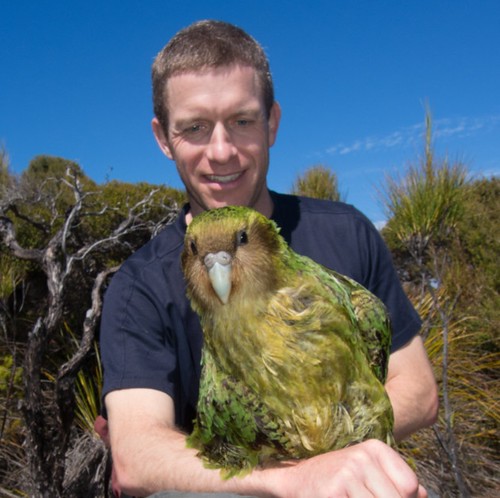A Norwich scientist’s plight to save a rare flightless parrot
 Saturday, December 27, 2014 at 2:44
Saturday, December 27, 2014 at 2:44  Andrew Digby in New Zealand with a Kakapo.Adored by a country and loved for its quirkiness the world over, the Kakapo parrot is part of a huge conservation project to save it from extinction. Now one man from Norwich is playing an integral part in its recovery over 11,000 miles away in New Zealand.
Andrew Digby in New Zealand with a Kakapo.Adored by a country and loved for its quirkiness the world over, the Kakapo parrot is part of a huge conservation project to save it from extinction. Now one man from Norwich is playing an integral part in its recovery over 11,000 miles away in New Zealand.
Andrew Digby, a former student at the Hewett School, returned to Norwich this week to celebrate Christmas with his parents in Upper Stoke Holy Cross - taking a break from his home on New Zealand’s south island.
The scientist, who works for the country’s Department of Conservation, plays a key role in the Kakapo Recovery Programme which aims to help preserve this unique and irreplaceable bird.
 A Kakapo in its native habitat in New Zealand.With only 126 Kakapo left in the world they have been ranked fourth on the list of the world’s most evolutionarily distinct and globally endangered birds.
A Kakapo in its native habitat in New Zealand.With only 126 Kakapo left in the world they have been ranked fourth on the list of the world’s most evolutionarily distinct and globally endangered birds.
Dr Digby, 39 said: “They are charismatic birds. They are weird and wacky from a scientific point of view and they are pretty cute too.”
With a background in astrophysics, and a stint with NASA, Mr Digby retrained as a conservation scientist for a role which takes him to rugged and idyllic locations across New Zealand.
The Kakapo, a once common bird, was almost wiped out after the introduction of predatory mammals to the north and south islands in the nineteenth century.
As part of the Recovery programme the 126 birds - up from 50 in 1990 - are now sited across three predator-free islands off mainland New Zealand.
The birds, all individually named, are carefully managed in the intensive conservation programme which uses cutting edge technology to preserve the species including transmitters and electronic food hoppers.
Rangers travel across the islands by aeroplane and helicopter to monitor and health check the birds which reside in the rugged mountain tops.
Dr Dibgy said: “there is no such thing as a usual day. This year I have spent about three months in the field travelling across the islands. There is a lot of science behind the work we do from population modelling to managing nutrition.”
 Andrew Digby at work in the rugged mountains of New Zealand in the search for the well camouflaged Kakapo.The birds, who cannot be kept in captivity, are often hand-reared as chicks before being relocated to one of the islands.
Andrew Digby at work in the rugged mountains of New Zealand in the search for the well camouflaged Kakapo.The birds, who cannot be kept in captivity, are often hand-reared as chicks before being relocated to one of the islands.
One of the first birds to be hand reared was Sirocco who now works as a ‘Spokesbird’ for the programme, highlighting the plight of the birds worldwide.
For eight months of the year 17 year old Sirocco lives on an island and for the other four months he tours the country as an advocate for the species.
Mr Digby said: “I recently flew with Sirocco sat beside me on a flight to Wellington to visit parliament and the pilot announced there was a special celebrity on board - the whole country loves him and loves the Kakapo.”
Dr Digby cites his childhood spent in Norfolk as inspiration for his career and fondly remembers regular visits to bird reserves along the River Yare as well as Minsmere and the north Norfolk coast.
He said: I’ve always followed what I enjoy doing. For this job I was following a dream. Flying in helicopters to the islands is awesome but the fact that I’m actually doing science for a real reason is one of the best parts of my job - that and seeing the birds on the tops of the mountains is incredible. I’d be very happy doing this for the rest of my life.”
The ultimate vision is to get the birds back on to the mainland so the public can see them and experience them.
 Strigops habroptilus - Kakapo | in
Strigops habroptilus - Kakapo | in  Conservation
Conservation 
